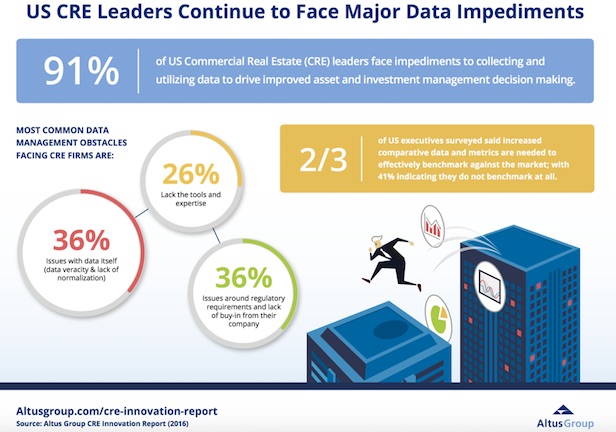
TORONTO—The data are out there; the problem is bringing them all together. A recent survey by Toronto-Based Altus Group, which provides advisory and data solutions to the commercial real estate industry, reports that 89% of owner-operator and owner-investor firms globally face major impediments to collecting and utilizing data to drive improved asset and investment management decision making. The figure rises slightly to 91% across US firms.
Data veracity and lack of normalization are the most common obstacles faced by firms in this industry, followed by regulatory requirement issues and lack of tools and expertise within their organizations. Similarly, 89% of firms surveyed said their business could eliminate or reduce data silos through better integration and standardization, but for what the report identifies as an “unconnected approach” to managing information. The report was conducted among more than 300 international CRE firms with assets under management of at least $500 million.
“To succeed in today's CRE market, firms need more than great assets, tenants and partners,” said Altus CEO Robert Courteau said when the report was issued last month. “The ability to capture, analyze and understand the growing amount of data that is available is critical to driving strategic decision making.” GlobeSt.com spoke with Courteau for additional insights into the report and its findings.
GlobeSt.com: The report makes clear that the commercial real estate industry lags in terms of investment in technological infrastructure. Is the industry also less aware that there should be more of an investment?
Robert Courteau: There's a growing awareness. Virtually every industry has moved to an environment where they're trying to create value through data. You even have professional sports teams taking on the responsibility of analytics to create a competitive advantage. In commercial real estate, there's an awareness of value, with some of the more aggressive leading companies starting to put that into play. I was at a meeting last week with two of the largest real estate asset owners in the world. One of the guys handed out his card, and his title was “head of real estate strategy and data analytics.” So you're starting to see some of that coming together.
GlobeSt.com: Among the various types of CRE firms, are the larger institutional owners more likely to have a more sophisticated understanding of it?
Courteau: Yes. Large institutional players that manage different equity classes are looking at having the same types of tools and capabilities that they enjoy in their equity investments also becoming available in real estate. Then you see some of the young real estate upstarts that are starting to use technology in the market. They may be more local, but then they start taking demographics and other economic data points to look at opportunities.

GlobeSt.com: The report identifies another area in which real estate firms are somewhat behind the curve, the integration of information systems. Is there less understanding of the importance, or are there other reasons?
Courteau: One of the keys is to have the tools as well as the people to operate these systems. After investing in a framework which is new, to be able to implement it is a challenge. But there is also a complexity to data in real estate that makes it difficult. Quite often, things change when the senior management of the company start asking questions. That is one of the other reasons there will be a lag. Then when you put globalization on top of this, that really causes some complexity in integration instead of standardization.
GlobeSt.com: When it comes to making investments, a lot of the dollar amount has gone toward smart-building technology, as opposed to other areas. What's behind this priority?
Courteau: They're going to begin by investing in things that they're comfortable with and with projecting the return on those investments. With smart buildings, they can imagine exactly how that return is going to be quantified in terms of expense reduction—lower heating bills and other things that they can get their arms around. Also, it can lead to increased user satisfaction with those buildings.
GlobeSt.com: Between start-ups and established analytics firms, commercial real estate companies now have a greater array of options for outside vendors than they would have had even a few years ago. Is this array of choices clouding the issue in terms of deciding which options to use?
Courteau: There's no question that real estate technology has grown exponentially. In 2012, there was about $150 million of venture capital invested around real estate technology solutions. This year, it will be about $2 billion. So there's clearly a lot more available in the market.
The trick is not to get enamored with the next, latest, greatest technology but to understand what these companies are doing and what your options are, and collecting that information to gain competitive advantage. So for me, taking the voyage of discovery with some of the new existing firms, and understanding from some of the more established analytics why they're building these solutions, is a really good and effective way to discover where you might have gaps as a company. To be able to do that, you probably need some people inside your organization who are dealing with these issues—make that basic investment at the start.

TORONTO—The data are out there; the problem is bringing them all together. A recent survey by Toronto-Based Altus Group, which provides advisory and data solutions to the commercial real estate industry, reports that 89% of owner-operator and owner-investor firms globally face major impediments to collecting and utilizing data to drive improved asset and investment management decision making. The figure rises slightly to 91% across US firms.
Data veracity and lack of normalization are the most common obstacles faced by firms in this industry, followed by regulatory requirement issues and lack of tools and expertise within their organizations. Similarly, 89% of firms surveyed said their business could eliminate or reduce data silos through better integration and standardization, but for what the report identifies as an “unconnected approach” to managing information. The report was conducted among more than 300 international CRE firms with assets under management of at least $500 million.
“To succeed in today's CRE market, firms need more than great assets, tenants and partners,” said Altus CEO Robert Courteau said when the report was issued last month. “The ability to capture, analyze and understand the growing amount of data that is available is critical to driving strategic decision making.” GlobeSt.com spoke with Courteau for additional insights into the report and its findings.
GlobeSt.com: The report makes clear that the commercial real estate industry lags in terms of investment in technological infrastructure. Is the industry also less aware that there should be more of an investment?
Robert Courteau: There's a growing awareness. Virtually every industry has moved to an environment where they're trying to create value through data. You even have professional sports teams taking on the responsibility of analytics to create a competitive advantage. In commercial real estate, there's an awareness of value, with some of the more aggressive leading companies starting to put that into play. I was at a meeting last week with two of the largest real estate asset owners in the world. One of the guys handed out his card, and his title was “head of real estate strategy and data analytics.” So you're starting to see some of that coming together.
GlobeSt.com: Among the various types of CRE firms, are the larger institutional owners more likely to have a more sophisticated understanding of it?
Courteau: Yes. Large institutional players that manage different equity classes are looking at having the same types of tools and capabilities that they enjoy in their equity investments also becoming available in real estate. Then you see some of the young real estate upstarts that are starting to use technology in the market. They may be more local, but then they start taking demographics and other economic data points to look at opportunities.

GlobeSt.com: The report identifies another area in which real estate firms are somewhat behind the curve, the integration of information systems. Is there less understanding of the importance, or are there other reasons?
Courteau: One of the keys is to have the tools as well as the people to operate these systems. After investing in a framework which is new, to be able to implement it is a challenge. But there is also a complexity to data in real estate that makes it difficult. Quite often, things change when the senior management of the company start asking questions. That is one of the other reasons there will be a lag. Then when you put globalization on top of this, that really causes some complexity in integration instead of standardization.
GlobeSt.com: When it comes to making investments, a lot of the dollar amount has gone toward smart-building technology, as opposed to other areas. What's behind this priority?
Courteau: They're going to begin by investing in things that they're comfortable with and with projecting the return on those investments. With smart buildings, they can imagine exactly how that return is going to be quantified in terms of expense reduction—lower heating bills and other things that they can get their arms around. Also, it can lead to increased user satisfaction with those buildings.
GlobeSt.com: Between start-ups and established analytics firms, commercial real estate companies now have a greater array of options for outside vendors than they would have had even a few years ago. Is this array of choices clouding the issue in terms of deciding which options to use?
Courteau: There's no question that real estate technology has grown exponentially. In 2012, there was about $150 million of venture capital invested around real estate technology solutions. This year, it will be about $2 billion. So there's clearly a lot more available in the market.
The trick is not to get enamored with the next, latest, greatest technology but to understand what these companies are doing and what your options are, and collecting that information to gain competitive advantage. So for me, taking the voyage of discovery with some of the new existing firms, and understanding from some of the more established analytics why they're building these solutions, is a really good and effective way to discover where you might have gaps as a company. To be able to do that, you probably need some people inside your organization who are dealing with these issues—make that basic investment at the start.
Want to continue reading?
Become a Free ALM Digital Reader.
Once you are an ALM Digital Member, you’ll receive:
- Breaking commercial real estate news and analysis, on-site and via our newsletters and custom alerts
- Educational webcasts, white papers, and ebooks from industry thought leaders
- Critical coverage of the property casualty insurance and financial advisory markets on our other ALM sites, PropertyCasualty360 and ThinkAdvisor
Already have an account? Sign In Now
*May exclude premium content© 2025 ALM Global, LLC, All Rights Reserved. Request academic re-use from www.copyright.com. All other uses, submit a request to [email protected]. For more information visit Asset & Logo Licensing.








